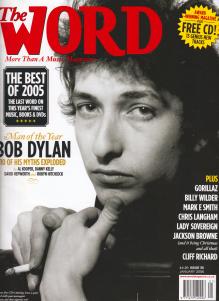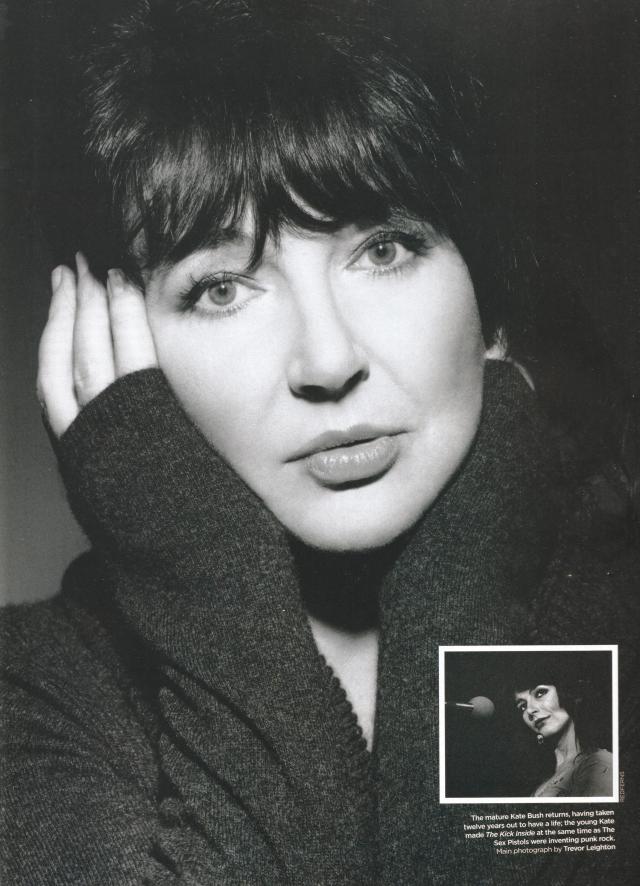Issue 35
January 2006

Cover star – Bob Dylan
Word shuffle
1) P36 – Joe Muggs writes about Lady Sovereign and calls her “the Daily Mail‘s nightmare: the voice of the multicultural underclass answering back; not only bolshy but articulate, funny and optimistic”.
2) P79 – part of a six page spread about the absolute worst of everything. On this page, Geri Halliwell is named the worst pop star ever (“Geri’s legacy is the biggest pop lie ever told, the one that says ‘anyone can be a pop star”), the worst film is ‘Sammy And Rosie Get Laid’ (“Hanif Kureshi’s hamfisted harrangue at all things Thatcher looked merely risible in its day. Two decades on it looks like a dictionary definition of everything that went wrong with post-’60s British cinema”), ‘Captain Corelli’s Mandolin’ is the worst book (“I only managed to finish it because I was paid. The author recently boasted “I think my books have a built-in mechanism for eliminating readers with poor concentration. I only want determined readers”. Well, I only want want good writing and there was precious little of it here.”) and Madonna’s ‘Sex’ book is declared the worst pop star side project.
3) P17 – second page of Sylvia Patterson’s ‘Facetime’ with Chris Langham. She asks him if he’s glad that he took the scenic route to fame. “Well, I drank too much and took a lot of drugs and then didn’t die and found out it was OK to get through life without having to do that. I mean, it’s a high class problem to have and irksome though it’s been to live a life which seems to be extremely compromised from the point of view of being successful, that is my gift. My gift is that I’m not a fuck-up”
4) P101 – part of a three page article by Stuart Maconie rounding up the year (2005) in music. “Spiky post-punk continued to be the template for UK guitar rock, be it in the shape of Franz Ferdinand, Maximo Park, Editors, Bloc Party, Futureheads or any one of a rat of bands weaned on their older brother’s copy of ‘Unknown Pleasures’. Ever inventive, Oasis picked a new ’60s British pop group to pilfer, The Kinks this time, for ‘The Importance Of Being Idle’, the year’s most enervating hit.”
5) P55 – the musician Terry Edwards has a letter published about the piece on John Peel in the previous issue. “Frankly, if I had to trade never being played on his show again for him being alive and well I wouldn’t think twice.”
Interesting – Mark E Smith is interviewed by Roy Wilkinson. “I don’t like lyric sheets. There should be an element of mystery. People should be wondering what you’re singing. It should be surprising when you work out what it’s actually saying. I grew up with an Irish family in Salford. I went a bit nuts when I was eight or nine, and me mam and dad were pretty poor, so I ended up staying with this family who were helping me mam and dad out. They were always singing Elvis or Dubliners songs. They never knew the lyrics – they just used to make ’em up. I remember them singing ‘All The Young Dudes’ – “I’m going to Woolworths, I’m gonna shag some cow to death…’ That’s the stuff [laughs]”.
Christopher Bray rounds up the books of 2005 and gives “…the real prize for paper usage in the past year to…Sudoku”. He goes on – “The weird thing is, although everyone you see on the train these days is filling in their missing numbers, they are all doing so in newspapers and not books – so who’s buying these collections? The Sudoku Conundrum – sounds like the new Robert Ludlum thriller.”
Various writers attempt to dispel myths about Bob Dylan. Danny Kelly takes on the received wisdom that Bob was ‘Only Any Good In The ’60s & ’70s’.
“Dylan is Dylan. Or, to be rather less mythological about it, Bob Dylan is Bob Dylan. He never conformed to the laws that govern normal pop stars, normal artists or even normal human beings. Thus he has never quite been where we’ve thought he’s been, or where we’ve expected him to be. Equally, he’s often been somewhere, artistically, that no one else can apparently see. When he was appointed Spokesman For A generation, he thought he was actually a jobbing folkie. When he was viewed as the speed freak demon king of rock and roll, he thought he was a smart arse French poet. And, for a couple of decades now, when he could reasonably be expected to be declining gently into his his physical and artistic dotage, he has in fact kept up a working schedule that younger men would have found debilitating and that many others – refusing to swallow Dylan’s get-out line about being “just a song and dance man” – have found utterly baffling. The result of all this is that it’s hopeless to try and divide Dylan’s stuff up. It has to be taken for what it is, warts and all.”
Andy Gill argues against the saw that ‘Dylan Was A Protest Singer Who Sold Out’.
“If his detractors cared to investigate, it was obvious that Dylan had never abandoned protest at all. Indeed, at exactly the point when folk purist were accusing him of treachery, he wrote and recorded a series of songs – most notably ‘Gates Of Eden’, ‘It’s Alright Ma, I’m, Only Bleeding’ and ‘Desolation Row’ – that were effectively protest songs of a higher order. What Dylan was really being attacked for, in effect, was his refusal to stick to simplistic naturalism.”
Longer article
Paul Du Noyer reviews ‘Ariel’ by Kate Bush.

